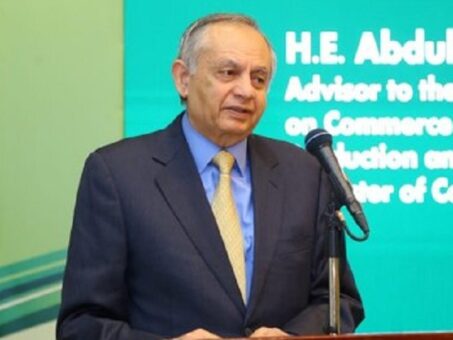KARACHI: Shazad Dada has been elected as president of Overseas Investors Chamber of Commerce and Industry (OICCI) for the term 2020.
This was announced at the 160th Annual General Meeting of the OICCI held at the Chamber on Friday, January 31, 2020.
Haroon Rashid, Managing Director Shell Pakistan Limited, was elected unopposed as the Vice President.
The other elected members of the OICCI Managing Committee for 2020 are as follows:
1. SYED ANIS AHMED, ABBOTT LABORATORIES (PAKISTAN) LIMITED
2. IMRAN AHMAD KHAN, BAYER PAKISTAN (PVT) LIMITED
3. GHIASUDDIN KHAN, ENGRO CORPORATION LIMITED
4. IRFAN SIDDIQUI, MEEZAN BANK LIMITED
5. MAREK ANDZEJ MINKIEWICZ, METRO PAKISTAN (PVT) LTD
6. ASTUSHI FUJII, MITSUBISHI CORPORATION
7. SAMER CHEDID, NESTLE PAKISTAN LIMITED
8. DR. IMRAN RASHEED, NOVARTIS PHARMA (PAKISTAN) LIMITED
The Incoming OICCI President Shazad Dada in his message to the members said that he strongly believes that Pakistan offers considerable growth potential for existing foreign investors and attractive opportunities for new investors.
He said his conviction is supported by OICCI members who invested over US$ 13 billion in new capital expenditure in the last seven years.
He opined that the current dip in the economic cycle of the country will soon revert back to a positive growth trend.
He lauded the role of OICCI for promoting Pakistan to potential foreign investors during the Chamber’s regular interaction with foreign business and governmental delegations and senior diplomats based in and outside Pakistan.
Shazad also appreciated the quality of OICCI business climate/perception surveys, the Chamber’s focused and continuing advocacy efforts for streamlining the taxation system, giving practical policy input for increasing the efficiency of energy sector, initiatives on women empowerment and gender equality, the Chamber’s role in improving the security environment, and in taking the Intellectual Property Rights regime in Pakistan to a higher level, which included the publication of a comprehensive IPR manual for the benefit of all innovators and brand owners.
Shazad Dada is the Chief Executive Officer and member of the Board of Directors of Standard Chartered Bank (Pakistan) Ltd. He graduated with honours from University of Pennsylvania with Bachelors of Science and Bachelors of Arts degrees, and also has an MBA from the Wharton Business School, University of Pennsylvania.
He is a seasoned banker and a prominent capital markets professional, with over 26 years of diverse experience with renowned financial institutions in the United States and Pakistan.
Prior to joining Standard Chartered, he was the CEO of Barclays Pakistan. Shazad has also worked at the Deutsche Bank Securities Inc in New York for over 15 years in various capacities before moving back to Pakistan as Managing Director Deutsche Bank AG Pakistan
Shazad is the Chairman of the Board of Trustee of Developments in Literacy (DIL) Pakistan, member of Board of Directors British Business Centre Pakistan.
He is also a Council member of Institute of Bankers Pakistan. Shazad was recently recognised as the sixth top Advocate Executive globally by the HERoes Women Role Model Lists 2019 supported by Yahoo Finance for his achievements in promoting gender diversity at workplace.
He is an avid golfer with a keen interest in a number of other sports.





